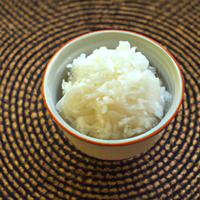
1 serving (158 grams) contains 205 calories, 4.3 grams of protein, 0.4 grams of fat, and 45.0 grams of carbohydrates.

Log this food in SnapCalorie

Nutrition Information
Calories |
205.0 | ||
|---|---|---|---|
% Daily Value* |
|||
| Total Fat | 0.4 g | 0% | |
| Saturated Fat | 0.1 g | 0% | |
| Polyunsaturated Fat | 0 g | ||
| Cholesterol | 0 mg | 0% | |
| Sodium | 1 mg | 0% | |
| Total Carbohydrates | 45 g | 16% | |
| Dietary Fiber | 0.6 g | 2% | |
| Sugars | 0 g | ||
| protein | 4.3 g | 8% | |
| Vitamin D | 0 mcg | 0% | |
| Calcium | 16 mg | 1% | |
| Iron | 1.1 mg | 6% | |
| Potassium | 55 mg | 1% | |
* Percent Daily Values are based on a 2,000 calorie diet. Your daily values may be higher or lower depending on your calorie needs.
Food Attributes
Source of Calories
About One cup of white jasmine rice cooked
White jasmine rice is a fragrant, long-grain variety commonly grown in Thailand and widely used in Southeast Asian cuisines. When cooked, its soft, slightly sticky texture and delicate floral aroma make it a versatile addition to dishes like stir-fries, curries, and grilled meats. One cup of cooked jasmine rice provides around 205 calories, primarily from carbohydrates, making it an excellent energy source. It contains minimal fat and protein and is low in fiber. While it is less nutrient-dense than whole-grain rice options like brown jasmine rice, it pairs well with nutrient-rich vegetables and proteins to create balanced meals. Its mild flavor and alluring scent make it a favorite in global kitchens, though portion control is key for those managing blood sugar levels, as jasmine rice has a higher glycemic index compared to other rice varieties.



